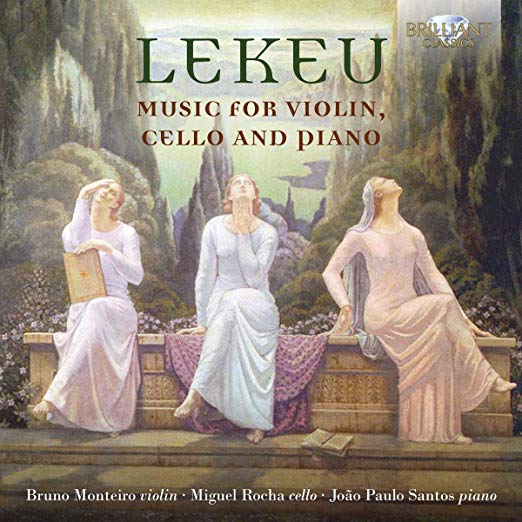

Sonata for Violin and Piano in G
Trio for Piano, Violin and Cello in C minor
The chamber music of Belgian composer Guillaume Lekeu (1870-1894) is highly expressive, emotive and passionate, as well as being stylistically and harmonically advanced for a 20 year old. He must have poured a tremendous amount of time and effort in its creation, which may explain why he died of complications from fever at the age of 24. The first movement alone of the Sonata for Violin and Piano in G is a prime example of large scale writing for small scale forces, as his grasp of extended development combined with highly chromatic harmonic deployment is exceptional. So much so that he's been accused of saying too much, whereas I believe that his structural layout is in equal proportion to his expressive power. It's like a combination of the transcendent visions of Liszt and the dramatic outlook of Wagner. His Violin Sonata is just as polished as the one by Franck and yet it has only been recorded about 10 times compared to the Franck which boasts around 175 recordings. A situation that must be corrected.
As I had mentioned previously in reviews of his recordings of the music of Fernando Lopes-Graca and Erwin Schulhoff, violinist Bruno Monteiro shapes each phrase differently according to its expressive content or emotive weight. For example the sweet tone he uses to introduce the main motif of the Sonata eventually becomes emotionally charged or downright inexorable in its discourse. And because pianist Joao Paulo Santos has been collaborating with Monteiro for quite a while now, the piano reacts to the violin in a symbiotic fashion and follows the action accordingly while adding its own insights. And the sadness they both express at the end of the middle slow movement is quite touching. Quite the opposite can be said about the Scherzo movement of the Trio for Piano, Violin and Cello in C minor in which Bruno Monteiro, Joao Paulo Santos and cellist Miguel Rocha all jump into the action guns blaring, and deliver a highly commited reading. And once you hear this deeply dramatic and moving account of the ending of this Trio, you will definitely feel the need to further explore the music of Guillaume Lekeu.
Most of his music is tinged with melancholy, and in his own words Lekeu admits: "Joy is a thousand times more difficult to paint than suffering". It's unfortunate he died so young and left behind but a small example of his immense potential.
Jean-Yves Duperron - May 2019